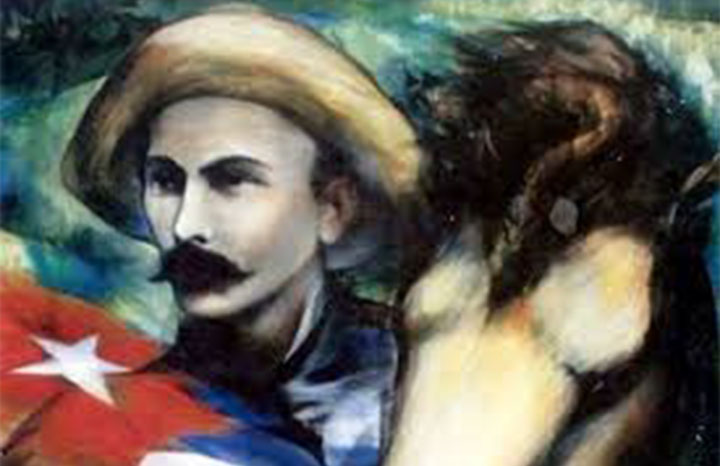
Only one of his virtues will be enough to be remembered and loved, but Jose Marti, fallen in combat on May 19, 1895, 130 years ago, in Dos Rios, had so many that explains today why he continues to be the illuminating beacon of light for the thinking and awareness of Cubans and at the same time their National Hero.
Poet and journalist since he was a teenager, he was also a revolutionary and politician, in favor of the independence of his native land from an early age.
He arrived in Dos Rios, since his death a sacred place for his fellow countrymen, after his return to his homeland since April 11, to get fully involved in the combats of the Necessary War organized by him after 15 years of exile in the United States.
To those who, out of appreciation, advised him not to go to direct war, because he was a man of letters and a politician and not a soldier, he made it clear that he was going to fully comply with his duty, since he had been the evocator of that libertarian campaign.
Before the enemy bullets knocked him off his horse in his first and last combat, he was promoted to the rank of Major General of the Liberation Army, at the La Mejorana farm, with the consent of General Máximo Gómez and the Bronze Titan, Antonio Maceo, lieutenant general.
The start of the new epic of the Cubans took place on February 24, 1895, but the leaders could only arrive in Cuba days later, at the beginning of April.
In the camps there was even talk of José Martí as president of the future free Cuba, although he preferred to be identified as a delegate of the Cuban Revolutionary Party, essential in the mobilization that made the campaign a reality, and inasmuch as he was clear about the nation to be founded once sovereignty was achieved.
On the previous eve of his physical death, in an unfinished letter to his dear Mexican friend Manuel Mercado, he confessed to having worked secretly and conscientiously to prevent the expansion of the United States in America with the freedom of Cuba. And he would continue to do so.
That irrefutable statement continues to be an illuminating clarion call for his fellow countrymen of today and always.
The poet, essayist, writer and journalist José Martí had great recognition for his intellectual work, which included work as a professor and diplomat in several countries of America. All this work, which he undoubtedly loved, he gave up to devote himself entirely to the cause of independence when he believed the time had come.
Not to mention the pain he suffered from the misunderstandings of his mother, Leonor Pérez, and his father, Mariano Martí, as well as his former wife, Carmen Zayas Bazan.
Despite this, there still remain treasures of his creation such as Versos sencillos (Simple Verses), Versos libres (Free Verses), the collection of poems Ismaelillo, dedicated to his son Jose Francisco, and the Edad de Oro (Golden Age). He is considered the father of the modernist poetic movement, an assessment that is still debatable but well-founded.
His essay Nuestra America (Our America) and his valuable testimonies in journalism such as the Crónicas norteamericanas (North American Chronicles) and the Seccion Constante (Constant Section) of the Venezuelan newspaper El Nacional also survive.
His extensive paperwork that includes speeches, documents and letters to family and friends, compiled in The Complete Works, is a monument of wise teachings in multiple aspects, which also show him with great philosophical gifts without having that profession.
To organize the necessary war was the number one task of his life, by his own will in his last years, and he did a hard and titanic work in the midst of his modest conditions bordering on poverty in that work in a foreign land, where he was also watched and chased.
He took the role left years ago by the founding fathers and to fulfill the enormous task he was faithful to the sacrifice and the wear and tear of his health, under the principles of his honesty, always strengthened and even happy and full of happiness on the eve of his final farewell. That is why he was also called Master and Apostle of Independence.
Nowadays, his compatriots enlarge and make more beautiful the monument that specifies the place of his death, facing the sun, in Dos Ríos, a plain near the municipality of Jiguani, in today's Granma province.
And they do more, they remember him from the school activities and readings, that pretend to know him in such a multiple and deep way as it was his existence. To enjoy his poems, to learn from his political and human lights are among their objectives.
They commit themselves daily with him, trying to follow his thought to maintain a sovereign Homeland, with all and for the good of all.
Sidebar

 Agencia Cubana de Noticias
Líder en información nacional
Agencia Cubana de Noticias
Líder en información nacional








Nos reservamos el derecho de no publicar los comentario que incumplan con las normas de este sitio